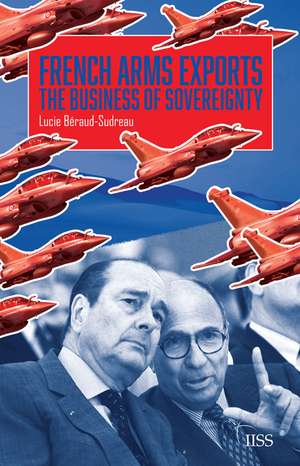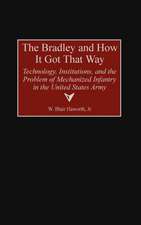French Arms Exports: The Business of Sovereignty: Adelphi series
Autor Lucie Béraud-Sudreauen Limba Engleză Paperback – 26 mar 2020
From De Gaulle onwards, France's strategic independence has been predicated on self-sufficiency in modern weapons. To achieve and maintain the requisite defence-industrial base, in the context of limited domestic orders, Paris sought to promote the export of its arms. During the Cold War, this underpinned but was also an expression of France's determination to resist bipolar domination. France offered customers around the world an alternative to reliance on one superpower or the other; and in doing so it generated the revenue to support an extensive domestic arms industry. The end of the Cold War ushered in fundamental changes, however: Western defence spending shrank and the global market was turned upside down. While France's arms-export policy was less affected by human-rights concerns than other democracies, it was not immune to pressures stemming from the consolidation of Europe's defence-industrial base and the increased interest of the EU in regulating the arms trade.
This Adelphi book considers how France has responded to changing political and market circumstances in the way that it promotes and controls the export of weapons. It examines the rationale for considering a liberal arms-export policy as essential to French independence, and the institutional arrangements that underpinned this. It tracks the dramatic changes in the global arms market since 1990, in terms of demand and market competition, and charts the response of the French government to these changes. The book underlines how the French machinery of government, as a directing force behind the defence industry, has been resistant to the notion of export restraint - even in the case of sales to authoritarian regimes. However, it argues that France now faces a dilemma over whether to continue with a long-successful course, or to moderate its independence through greater collaboration to bolster European integration and better compete globally.
Din seria Adelphi series
-
 Preț: 279.92 lei
Preț: 279.92 lei -
 Preț: 108.97 lei
Preț: 108.97 lei -
 Preț: 109.86 lei
Preț: 109.86 lei -
 Preț: 183.63 lei
Preț: 183.63 lei -
 Preț: 208.06 lei
Preț: 208.06 lei -
 Preț: 270.50 lei
Preț: 270.50 lei -
 Preț: 183.87 lei
Preț: 183.87 lei -
 Preț: 207.84 lei
Preț: 207.84 lei -
 Preț: 183.74 lei
Preț: 183.74 lei -
 Preț: 230.99 lei
Preț: 230.99 lei -
 Preț: 131.89 lei
Preț: 131.89 lei -
 Preț: 158.89 lei
Preț: 158.89 lei -
 Preț: 213.33 lei
Preț: 213.33 lei - 27%
 Preț: 210.55 lei
Preț: 210.55 lei -
 Preț: 273.21 lei
Preț: 273.21 lei -
 Preț: 299.65 lei
Preț: 299.65 lei -
 Preț: 297.65 lei
Preț: 297.65 lei -
 Preț: 298.80 lei
Preț: 298.80 lei -
 Preț: 307.11 lei
Preț: 307.11 lei -
 Preț: 295.91 lei
Preț: 295.91 lei -
 Preț: 298.39 lei
Preț: 298.39 lei - 26%
 Preț: 229.86 lei
Preț: 229.86 lei -
 Preț: 296.13 lei
Preț: 296.13 lei -
 Preț: 297.44 lei
Preț: 297.44 lei -
 Preț: 297.96 lei
Preț: 297.96 lei - 28%
 Preț: 154.76 lei
Preț: 154.76 lei -
 Preț: 296.68 lei
Preț: 296.68 lei -
 Preț: 272.78 lei
Preț: 272.78 lei -
 Preț: 300.50 lei
Preț: 300.50 lei - 20%
 Preț: 131.09 lei
Preț: 131.09 lei -
 Preț: 297.27 lei
Preț: 297.27 lei -
 Preț: 297.11 lei
Preț: 297.11 lei -
 Preț: 296.52 lei
Preț: 296.52 lei -
 Preț: 301.31 lei
Preț: 301.31 lei -
 Preț: 295.53 lei
Preț: 295.53 lei - 20%
 Preț: 253.86 lei
Preț: 253.86 lei - 28%
 Preț: 154.79 lei
Preț: 154.79 lei - 28%
 Preț: 141.31 lei
Preț: 141.31 lei - 27%
 Preț: 155.19 lei
Preț: 155.19 lei - 27%
 Preț: 157.00 lei
Preț: 157.00 lei - 28%
 Preț: 166.71 lei
Preț: 166.71 lei -
 Preț: 252.88 lei
Preț: 252.88 lei -
 Preț: 295.53 lei
Preț: 295.53 lei -
 Preț: 297.53 lei
Preț: 297.53 lei -
 Preț: 295.75 lei
Preț: 295.75 lei -
 Preț: 311.86 lei
Preț: 311.86 lei -
 Preț: 311.86 lei
Preț: 311.86 lei - 28%
 Preț: 154.32 lei
Preț: 154.32 lei -
 Preț: 296.72 lei
Preț: 296.72 lei
Preț: 176.86 lei
Nou
33.84€ • 35.43$ • 28.07£
Carte disponibilă
Livrare economică 19 martie-02 aprilie
Livrare express 05-11 martie pentru 23.05 lei
Specificații
ISBN-10: 0367511452
Pagini: 188
Dimensiuni: 156 x 234 x 14 mm
Greutate: 0.34 kg
Ediția:1
Editura: Taylor & Francis
Colecția Routledge
Seria Adelphi series
Locul publicării:Oxford, United Kingdom
Public țintă
Postgraduate, Professional, and UndergraduateCuprins
Notă biografică
Recenzii
"French Arms Exports: The Business of Sovereignty is poised to become the go-to resource on the contemporary French arms trade. Not since the 1970s has there been such a carefully researched, historically rich and politically knowledgeable book about the French arms trade, and Béraud-Sudreau ably brings us from the Cold War to the modern day, using a wealth of original interview evidence. In doing so, she also offers important insights into the sources of continuity in French arms exports, amidst great political, economic and military change."-- Jennifer L. Erickson, Author of Dangerous Trade: Arms Exports, Human Rights, and International Reputation and Associate Professor of Political Science at Boston College
"This book is a must-read for anyone who wishes to understand French defence-export policy and its foundation in the broader policy conception of strategic autonomy. Taking a systematic deep dive, Lucie Béraud-Sudreau not only elaborates upon the relevant actors and internal power dynamics in the policy process, she also analyses the changes in policies and outcomes when France had to react to a shifting European and global political and industrial landscape."-- Dr Christian Mölling, Deputy Director, German Council on Foreign Relations (DGAP)
Descriere
From De Gaulle onwards, France's strategic independence has been predicated on self-sufficiency in modern weapons. To achieve and maintain the requisite defence-industrial base, in the context of limited domestic orders, Paris sought to promote the export of its arms. During the Cold War, this underpinned but was also an expression of France's determination to resist bipolar domination. France offered customers around the world an alternative to reliance on one superpower or the other; and in doing so it generated the revenue to support an extensive domestic arms industry. The end of the Cold War ushered in fundamental changes, however: Western defence spending shrank and the global market was turned upside down. While France's arms-export policy was less affected by human-rights concerns than other democracies, it was not immune to pressures stemming from the consolidation of Europe's defence-industrial base and the increased interest of the EU in regulating the arms trade.
This Adelphi book considers how France has responded to changing political and market circumstances in the way that it promotes and controls the export of weapons. It examines the rationale for considering a liberal arms-export policy as essential to French independence, and the institutional arrangements that underpinned this. It tracks the dramatic changes in the global arms market since 1990, in terms of demand and market competition, and charts the response of the French government to these changes. The book underlines how the French machinery of government, as a directing force behind the defence industry, has been resistant to the notion of export restraint - even in the case of sales to authoritarian regimes. However, it argues that France now faces a dilemma over whether to continue with a long-successful course, or to moderate its independence through greater collaboration to bolster European integration and better compete globally.







